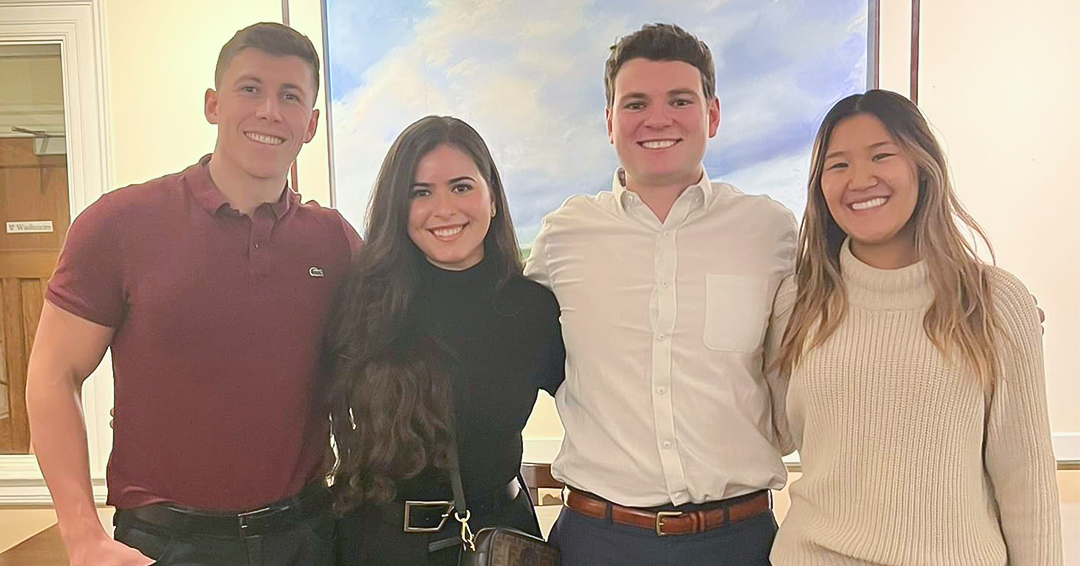
The McGill Association of Students in Healthcare (MASH) builds on interprofessional education by organizing opportunities for learners in health-related programs to meet up, network and share knowledge that improves patient care
A graduate of the Faculty of Medicine and Health Sciences’ master’s in experimental surgery program, Kenneth Drummond, now a third-year dental medicine student, has always been interested in interprofessional education. This passion was solidified in 2019, when he joined the McGill Association of Students in Healthcare (MASH).
“I really liked that it brought the healthcare disciplines together,” Drummond says. “I also felt it reflected what we needed more of in the future of healthcare, which is fostering collaboration and recognizing each of our roles in the care continuum for patients.”
Founded in 2016, MASH unites learners from 27 health-related disciplines and interprofessional student groups. Students in medicine, nursing, physical therapy, occupational therapy, dentistry, clinical psychology, rehabilitation sciences, kinesiology, speech language pathology, nutrition, family medicine, social work, epidemiology, biostatistics and occupational health are welcome to join.
Drummond is one of five managing coordinators of this student association, alongside Sebastien Bleau, a third-year dental medicine student, Sabrina Chan, a third-year medical student, Morgane Lasry, a master’s student in nursing and Ruth Tewah, a third-year undergraduate nursing student.
Greater level of collaboration for better patient care
Drummond was inspired to join MASH after realizing the importance of interprofessionalism and collaboration for patient care during his studies.
“One of the issues I noticed in my nutrition degree was that we were exposed to nutrition students, but we often didn’t talk about what a kinesiologist’s approach to helping a patient we would treat (would be),” he recalls.
“Having an awareness of each of our roles helps us to better treat patients, avoid overlap and enhance the delivery of care and efficiency in our field,” he adds.
All health professions students at McGill participate in the interprofessional education (IPE) curriculum, delivered by the Office of Interprofessional Education (OIPE). IPE helps students clarify their roles, learn about the roles of other healthcare providers and engage in teamwork and shared decision-making in a safe learning environment. They then receive formative feedback to prompt reflection on both individual and group/team accountability.
However, learners might not get the chance to interact with their peers in other health-related programs in real life. That’s where MASH comes in.
“Building off the IPE curriculum, MASH creates events where students come together and break the initial barriers in terms of socializing with one another,” Drummond says. “It’s creating contact and room for collaboration on various fronts – for research, networking or exposure to who people are and what they do.”
Wide-ranging support
MASH also represents the learner voice in conversations about advancing interprofessional education within the Faculty of Medicine and Health Sciences. Its team works closely with the OIPE, which provides support and funding for its initiatives. It also has the backing of the Office of the Vice-Dean, Education.
Cynthia Perlman, M.Ed., OT(C), erg., Director of the OIPE and Assistant Professor at the School of Physical and Occupational Therapy, describes MASH as a “strong advocate for IPE as a foundational support to drive interprofessional collaborative practice.”
“MASH participants learn with, from and about each other while sharing insights and professional knowledge in a safe and respectful social environment,” she adds. “Collaboration on research projects that incorporate interprofessional perspectives deepens their appreciation for diverse contributions. MASH offers connection, collaboration and community.”
Inspiring peers
The student association is now focused on increasing membership and inspiring their colleagues across disciplines to contribute to interprofessional collaboration at McGill.
“MASH has a lot of room for growth,” Drummond says. “We are actively looking for students who wish to be a part of this movement, fostering a collaborative and innovative milieu for the future of healthcare.”
Related:

